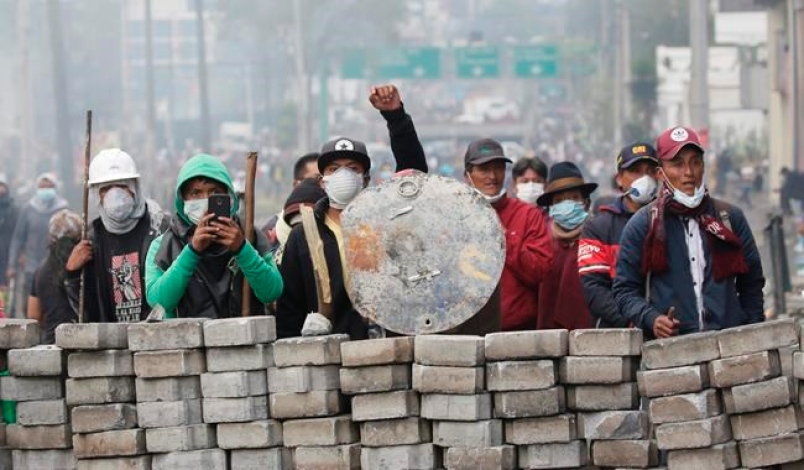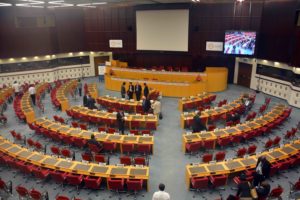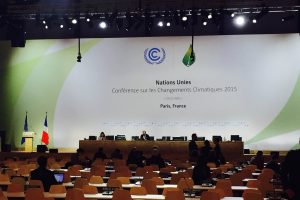Photo: Associated Press/Dolores Ochoa
IBON International Statement
15 October 2019
As the International Monetary Fund and the World Bank Group (IMF-WBG) hold their 2019 Annual Meetings in Washington D.C. this mid-October, mass mobilisations have thwarted IMF-dictated austerity measures in another part of the Americas, in Ecuador.
IBON International joins civil society and people’s movements around the world in rejecting austerity measures and all forms of neoliberal policy imposed on Southern peoples. We believe that the historical and current track record of neoliberal policy and institutions requires significant shifts in economic governance, away from systems that favour monopolistic corporations and finance capital at the expense of people’s economic rights and development.
The United States-led IMF has pushed austerity plans as part of fiscal consolidation strategies for “economic recovery” after the 2008 crisis. These commonly include increasing debt repayments matched with “cost-cutting” in the form of lower social spending, privatisation of social services or the freezing or lowering of minimum wages. These supposedly make debt sustainable, improve market competitiveness and boost inclusive growth. But these have only interfered with national legal and policymaking spaces and perpetuate structural inequalities. This has been the case of Greece and a few other European countries, and now, Argentina and Ecuador.
A 2019 UN Independent Expert report on IFI complicity in retrogressive economic measures found a “direct causal link between austerity and human rights violations” according to standards of international law.[i] Austerity exacerbates labour informality, and gender and income inequality. Low-income households experience the drastic negative impacts of reduced food subsidies, and cuts in basic social services such as housing, health and education. They bear the burden of related regressive tax reforms and indirect taxation policies. Labour market flexibilisation and cuts in basic social services such as education further marginalise women and girls, while increasing unpaid care work.
Currently, conditionalities are imposed on peoples as elite-led states “seek assistance” from IFIs during turbulent economic periods, sealing unequal relationships as IFIs influence countries’ economic policies. State-IMF “agree[ments] on a program of economic policies” before IMF provision of a loan are done without systematic assessment of rights impacts.[ii] Such IFIs are thus complicit in these state-perpetrated human rights violations, and “are clearly subject to international law.”[iii]
In the case of Ecuador, subsidies on fuel were withdrawn as part of the austerity plans for a USD 4.4-billion IMF loan, which raised fuel prices drastically. This package of “reforms” pushed by the IMF and Moreno government, encapsulated in the latter’s Decree 883, continued a path of economic policy contrary to people’s welfare. Worse, state actors committed clear violations against indigenous and workers’ movements asserting economic rights vis-a-vis austerity and the state’s favour for foreign corporations.
IBON International asserts that to actualise the right to development, peoples and their organisations must be leading voices in economic policy-making, and not IFIs such as the IMF-WBG. In prevailing undemocratic practices, affected populations do not have effective decision-making power in the negotiation of arrangements with IFIs yet are the ones primarily burdened by negative impacts.
IMF-driven austerity continues today amid current moves by the WBG and other multilateral banks to facilitate the full capture of the sustainable development agenda by big private sector and finance capital, such as institutional investors. Taken together, these belie the IMF-WBG’s pretensions of supporting people’s development.
Disastrous Structural Adjustment Programs of prior decades already made the United States-led IMF-WBG notorious for dictating shifts toward trade and investment liberalisation; deregulation, denationalisation and privatisation of economic sectors; and “financial integration” into global markets. The continuing trajectory of IFIs, primarily the IMF-WBG but also followed by the Asian Development Bank and the China-led Asian Infrastructure Investment Bank, makes people’s continuing disquiet and resistance unsurprising.
It is high time for fundamental changes in national and international economic and governance processes. The challenge for governments, if they really intend to actualise their rights obligations, is to reconsider their membership in the IMF-WB and other neoliberal IFIs, and reject the undue external influence of IFIs on economic policy. They must consider repealing laws driven by neoliberal norms, given recorded effects on people’s economic rights.
Meanwhile, IFIs such as the IMF-WBG must abandon discredited assumptions that put interests of big private sector and finance capital at the forefront. They must also be held accountable according to international law — current possibilities would be cessation of such IFI-dictated “reforms,” their non-repetition, and measures for reparations and remedy even for long-term, historical effects on rights.
People’s organisations remain the prime movers in resisting the implementation of such retrogressive economic measures. We enjoin civil society organisations (CSOs), people’s movements and campaigners around the world to continue solidarity for those actively resisting the dictates of IFIs, such as the peoples of Ecuador. Indigenous peoples and other progressive sectors have driven the government to verbally agree to the repealing of IMF measures, but remain vigilant while no real policy changes have taken effect. Their calls for the IMF to “get out” are not far removed from movements’ calls to “shut down”[iv] the IMF-WBG.
Movements and CSOs must continue holding governments accountable for acceding to neoliberal policy norms of US-led, and even China-led, IFIs. Such assertions of people’s sovereignty are the building blocks to transform elite-driven economies, governance and development processes at local, national and even international levels — towards people’s decisive roles in governance over the use of financial, productive and other non-financial resources, away from discredited neoliberal dogma and today’s monopoly capitalism. #
[i] UN General Assembly. 2019. “Report of the Independent Expert on the effects of foreign debt and other related international financial obligations of States on the full enjoyment of all human rights, particularly economic, social and cultural rights: Responsibility for complicity of international financial institutions in human rights violations in the context of retrogressive economic reforms.” A/74/178, July 16.
[ii]Ibid.
[iii]Ibid
[iv]People’s Global Conference Against the IMF-World Bank. 2018.



